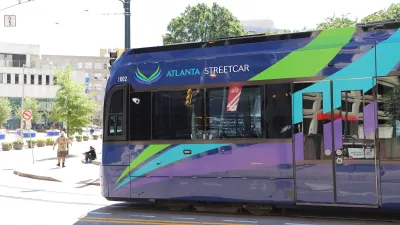Maggie Comstock looks at what it takes to be considered a "Smart City", and asks what an organizationally and infrastructurally challenged city like Atlanta can do to raise its IQ.
For Comstock, the established definitions of a smart city, based on technologically advanced or socially inclusive characteristics are inadequate. Her broader definition sounds somewhat like smart growth, and a lot like sustainable development: "At its most basic level, a city is comprised of a government (in some form), people, industry, infrastructure, education and social services. A smart city thoughtfully and sustainably pursues development with all of these components in mind with the additional foresight of the future needs of the city."
By these metrics, Comstock evaluates whether established, sprawling cities such as Atlanta can "boost its IQ." She turns to two initiatives that she argues are paving the way for "smarter and more sustainable habits."
"As for Atlanta, the USGBC Atlanta Branch of the Georgia Chapter has done a stellar job on this front, including facilitating the passage of a LEED green building policy for public sector buildings. The City of Atlanta has since signed up to be one of the three pilot cities for the President's Better Buildings Challenge, which charges cities to make commercial buildings 20% more energy efficient by 2020 and to accelerate private sector investment in energy efficiency."
While these measures are certainly smart, they seem to stretch the established "smart city" definitions to the breaking point.
Perhaps it's just time to choose some new buzzwords.
FULL STORY: What is a Smart City and How Can a City Boost Its IQ?

Trump Administration Could Effectively End Housing Voucher Program
Federal officials are eyeing major cuts to the Section 8 program that helps millions of low-income households pay rent.

Planetizen Federal Action Tracker
A weekly monitor of how Trump’s orders and actions are impacting planners and planning in America.

Ken Jennings Launches Transit Web Series
The Jeopardy champ wants you to ride public transit.

California Invests Additional $5M in Electric School Buses
The state wants to electrify all of its school bus fleets by 2035.

Austin Launches $2M Homelessness Prevention Fund
A new grant program from the city’s Homeless Strategy Office will fund rental assistance and supportive services.

Alabama School Forestry Initiative Brings Trees to Schoolyards
Trees can improve physical and mental health for students and commnity members.
Urban Design for Planners 1: Software Tools
This six-course series explores essential urban design concepts using open source software and equips planners with the tools they need to participate fully in the urban design process.
Planning for Universal Design
Learn the tools for implementing Universal Design in planning regulations.
Ada County Highway District
Clanton & Associates, Inc.
Jessamine County Fiscal Court
Institute for Housing and Urban Development Studies (IHS)
City of Grandview
Harvard GSD Executive Education
Toledo-Lucas County Plan Commissions
Salt Lake City
NYU Wagner Graduate School of Public Service





























